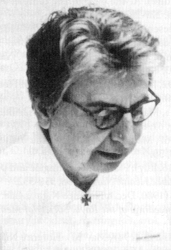Early Life
On August 9, 1900, Ernestine Wiedenbach was born to an affluent family in Hamburg, Germany. The Wiedenbach family immigrated to New York in 1909 and young Ernestine’s interest in nursing began as she quietly observed the care her sickly grandmother received.
Years later when Ernestine attended the prestigious Wellesley College, her sister’s friend regaled both women with stories from medical school. Ernestine became deeply impressed by the hospital setting and the role of nurses despite her liberal arts studies. After Ernestine graduated in 1922 with her Bachelors degree in Liberal Arts, she promptly enrolled in nursing school – much to the chagrin of her traditional-minded family.

Nursing School and Clinical Work
Miss Wiedenbach attended nursing school at Johns Hopkins between 1922 and 1925. While a nursing student, she served as spokesperson for a student grievances group. After an unspecified incident with the school’s administration, Ernestine was promptly expelled from the school. Thankfully, another Johns Hopkins alumna named Adelaide Nutting stepped in to help Ernestine. Adelaide reached out to the Johns Hopkins School of Nursing Director, Elsie Lawler, to allow Ernestine to continue her nursing studies. In the deal that Adelaide brokered, Ernestine was allowed to continue her studies under the express circumstances that she desisted organizing or encouraging dissent among the Hopkins nursing students. Ernestine complied with the draconian ruling and later credited Adelaide Nutting’s intervention with her ability to become a nurse.
Ernestine graduated in 1925 and was subsequently offered a supervisory position since she had a Bachelors Degree. For nine years Ernestine worked at Johns Hopkins and later at Bellevue in New York. While working, Ernestine continued her already extensive education. She graduated in 1934 from Columbia University’s Teacher’s College with both a Master’s Degree and a Certificate in Public Health Nursing. At that time Ernestine left Bellevue to work with the Association for Improving Conditions of the Poor, later reorganized and renamed as the Community Service Society of New York.
World War II
Ernestine soon thereafter left clinical and public health nursing to work as a professional writer. She worked primarily for the Nursing Information Bureau (NIB) and the American Journal of Nursing. During this time she not only honed her writing abilities but also networked with other academics, nurses, and professionals.
When Pearl Harbor was bombed, Ernestine found herself unable to volunteer due to a minor and unspecified heart condition. Therefore, she continued working with the NIB. She changed her focus from writing to training. She trained countless nurses to serve on both fronts of World War II.
Nurse Midwife
After spending years writing and training other nurses, Ernestine Wiedenbach’s desire was to get back into clinical nursing care. Hazel Corbin, the director of the Maternity Center Association of New York, managed to persuade Ernestine to attend the School for Midwives; Ernestine was 45 years old at the time.
After graduating as a nurse midwife, Ernestine continued to both practice the art of nursing and teach at the Teacher’s College. She worked at the Maternity Center Association and focused her teaching on advanced maternity nursing care. Ernestine loved both aspects of her job and related that midwifery in home deliveries was her favorite role as a nurse.
In 1952 Ernestine Wiedenbach was invited to join the Yale University School of Nursing faculty. She began as an instructor and quickly advanced to assistant professor and then further to associate professor. In 1956 she was named as the Director of Graduate Programs. As the Director, she was responsible for establishing both the maternal-newborn health and the nurse midwifery programs. In 1958 she wrote "Family-Centered Maternity Nursing", a comprehensive book on obstetrical nursing that has since become classic literature in the field.
Ernestine continued to teach at Yale. She taught with other well-known and respected instructors, such as Ida Orlando, and discussed nursing and philosophy with associates Patricia James and William Dickoff. After decades of clinical nursing, Ernestine Wiedenback’s nursing theory was developed with strong influences from her own experience and her association with other professionals and friends.
Nursing Theorist
Wiednebach’s nursing theory and books are still in use to this day. Her theories and books continue to be relevant in maternal-newborn nursing classrooms and theoretical discussions. According to Wiedenbach, the four key elements to clinical nursing are: philosophy, purpose, practice, and art.
Later Life
Ernestine Wiedenbach retired from clinical care in 1966, though she continued to write and publish articles. She never married and died on March 8, 1998. She is remembered for her devotion to the healing art of nursing, the profession of teacher, and for her contribution to nursing theories still in use today.
Further Reading
Wiedenbach, E. (1958). Family-centered Maternity Nursing, New York: G.P. Putnam’s Sons
Wiedenbach, E. (1963). The Helping Art of Nursing. American Journal of Nursing, 63(11), 54-57.
Wiedenbach, E. (1964). Clinical Nursing: a Helping Art. New York: Springer.
Wiedenbach, E. (1965). Family Nurse Practitioner for Maternal and Child Care. Nursing Outlook, 13(12), 50).
Wiedenbach, E. (1968). The Nurse’s Role in Family Planning: a Conceptual Base for Practice. Nursing Clinics of North America, 3(2), 355-365.
Wiedenbach, E. (1970). Nurses’ Wisdom in Nursing Theory. American Journal of Nursing, 70(5), 1057-1062.
McKee, N. J., Danko, M., Heidenreiter, T. J. Hunt, N. E., Marich, J. E., Tomey, A. M., McCreary, C. A., & Stuart, M. (1998). Ernestine Wiedenbach: The helping art of clinical nursing. In A. M. Tomey & M. R. Alligood (Eds.), Nursing theorists and their work (4th ed., pp. 86-98). St. Louis: Mosby.
Communication: Key to Effective Nursing (128p)










June 29th, 2014 at 9:03 pm
Thanks for this info. It helps me alot.